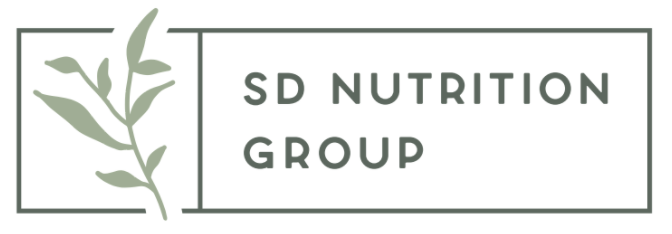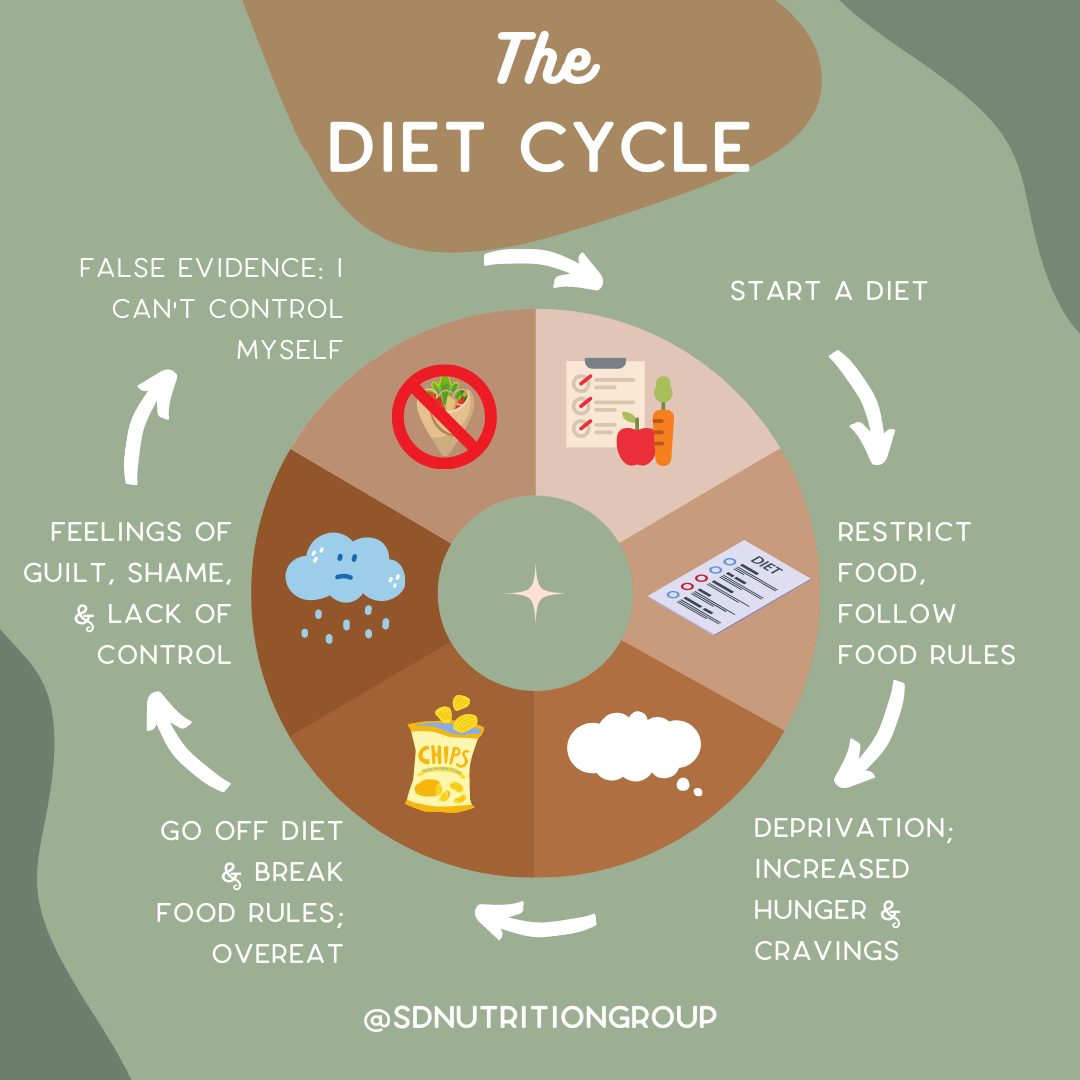Breaking Free From The Diet Cycle
Diets are designed to be enticing. Because of our culture’s obsession with thinness and “wellness”, and its fatphobia, the promises of shrinking the body and leading to optimal “health and wellness” are incredibly appealing. According to the CDC, the most common type of diet reported among all adults was a weight loss or low-calorie diet. However, 95% of all diets fail and most will regain the lost weight in 1-5 years.
Despite this failure rate, it’s all too tempting to keep coming back for more. It makes sense that dieting and its false promises are so appealing. It is ok to still have the desire to lose weight. Our culture puts immense pressure on people to be thinner, especially those in larger bodies. But dieting is actively harmful. It has been linked to eating disorders, is correlated with feelings of failure, low self-esteem, and social anxiety, and erodes self-trust.
Intuitive eating is a framework that exists to help you break free of the pursuit of thinness and not spend your life trapped in the diet cycle. You deserve to have a healthy, peaceful relationship with food, free of dieting, no matter what your body size.
Diets are sneaky because they put the burden of failure on the dieter when it’s the diet itself that is set to fail from the beginning. If you’re reading this, maybe you’ve had experiences with dieting before where you “fell off the wagon”, regained weight, and vowed to start over again, this time for real. Diets make the dieter feel like it’s a lack of discipline, lack of commitment, or laziness that leads to the diet failing. This results in feelings of guilt, shame, and low self-esteem for the dieter. Let’s look at the diet cycle:
You start out on a diet with good intentions. You want to lose weight, and perhaps improve your health as a bonus. Many diets these days appeal to the “wellness” fads by promising that they’re not diets, but lifestyle changes (any lifestyle change that puts rules on when/where/what/how you’re supposed to eat, or categorizes food as good or bad, is a diet). You follow the rules of the diet for a while, and at the beginning things feel really good. The diet feels relatively easy to follow, since the biological effects of food restriction haven’t set in yet. You may notice some weight loss at this phase, which is reinforced by positive compliments from others. This “dieter’s high” is what keeps diets in business. It’s normal to feel excited and hopeful about how this will benefit your life moving forward.
However, over time (it could be days, weeks, or months) deprivation builds and makes the diet harder and harder to follow. Our bodies don’t recognize restriction as intentional weight loss. All your body knows is that it’s not getting its energy needs met and so it goes into starvation mode. Hunger hormones increase, cravings for carbohydrate foods (energy!) increase, metabolism slows to preserve energy, and your body stores more energy in the form of fat to protect against starvation. It takes more and more willpower to be able to stick to the diet plan. Not to mention, diet rules get in the way of normal enjoyable food experiences- happy hours, birthday parties, dinner dates, donuts in the breakroom. These make it even more difficult to stick to a rigid diet plan.
The diet takes up increasingly more time and energy in your life, and you eventually give into the food cravings and hunger. For many chronic dieters, giving into these cravings and hunger usually results in eating that feels chaotic and out of control, and often results in significantly overeating or even binging. These out-of-control feelings around food lead to feelings of guilt and shame and provide false evidence that you can’t trust yourself around food without being on a diet. And the cycle starts all over again, with new determination that this time will be the one that sticks.
It’s important to emphasize that you, the dieter, are not the problem. Diets are fighting against your biological need for energy from food and satisfaction in eating. When a diet fails, it is not a question of willpower or self-control. Diets are going against our own biology as humans! Willpower has no place in intuitive eating. With intuitive eating, you learn to listen to your internal signals, which come from your natural instincts of how to get fed. Diet rules attempt to override these instincts. We are meant to eat when hungry and provide our bodies with adequate, enjoyable food. It’s how we are wired.
The overeating is not the source of the problem in the diet cycle; it’s the restriction and deprivation. Overeating or binging is your body’s way of trying to compensate for the energy your body has been missing while restricting. Diets also often leave you feeling very hungry, and this primal hunger drives overeating. You can imagine hunger-fullness cues in the diet cycle like swinging back and forth on a pendulum- going from one extreme to another. You feel extremely hungry on the diet, which leads to eating past the point of comfortable fullness. You feel guilty for overeating, restrict your food, and get super hungry again. By not restricting your food intake and not allowing yourself to reach that extreme level of hunger, it helps keep the pendulum somewhere in the middle- moderately hungry and comfortably full.
Practice feeding your body when it’s hungry and allowing yourself to have enough food, letting go of diet rules and restriction. This also means giving yourself unconditional permission to eat all foods you enjoy. The diet cycle breaks when restriction and deprivation are stopped. Breaking free of the diet cycle and learning to become an intuitive eater gives you the space to make peace with food and your body, just as it is today. If you are in recovery for an eating disorder, it may be helpful to follow a flexible meal plan designed by your dietitian.
This is a very abbreviated explanation of the diet cycle and how to break free. It can be really difficult to stop this cycle if you’ve been dieting for a long time. If you’re interested in learning more about intuitive eating, you can get the book here. And if you’re not sure where to start and would like some guidance, we would love to work with you on your intuitive eating journey. You can find our contact info here.

